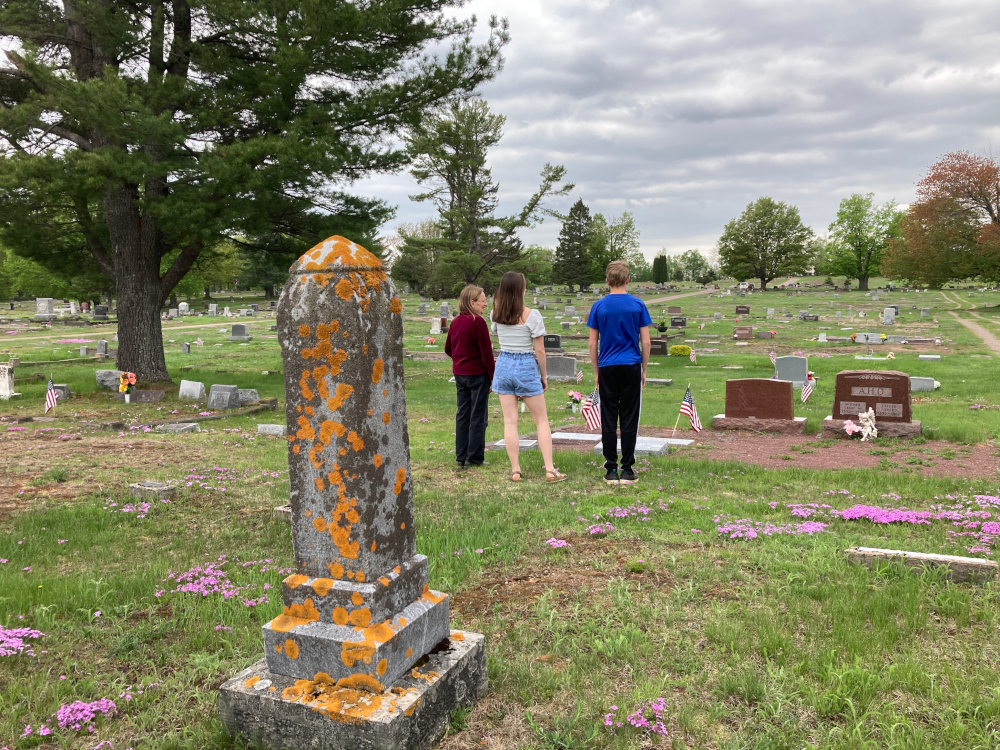Honoring Family During a Memorial Day Visit to the Cemetery

Every Memorial Day, I go with my mom, daughter, and son to the Lakeside Cemetery in Hancock, Michigan, to attend a ceremony honoring veterans. I drive separately in case I need to return home quickly to help my husband, Todd, who has ALS. The ceremony ends with the playing of “Taps” and a 21-gun salute, and then we visit family graves.
We clean bird poop off the headstone of my dad, who died six years ago at just 66 years old. The purple violets that my mom and kids planted near the base are growing nicely.
We walk to my grandparents’ graves. Both of my dad’s parents died when I was a child, and I have a few faint memories of them. My kids have memories of their papa, but not enough.
We drive across the cemetery to visit graves of earlier generations, and I feel a connection to these people I never met. They lived and died in the same area where I live now, and I have pictures and stories of them in my family scrapbook.
My father’s paternal grandparents are buried in the same plot as two of their children, who were siblings of my grandpa. Gustaff Siirtola, my great uncle, was born in 1903 and died in 1922. I do the math: 19 years old. His sister Sigrid was born in 1906 and died in 1924 at just 18 years old. I am struck by the brevity of their lives.
We visit the graves of my father’s maternal grandparents. My great-grandmother died at 45, when my grandma was only 13. I know it was hard to lose a mother at that age. I’m comforted by the thought that my grandma went on to live a full life. She grew up, got married, and had three children, the last of which was my dad. She had many happy years before she died.
Our kids will likely be too young to lose a parent when ALS takes their dad. My son is nearly 13 and my daughter 16, and I’m hopeful they’ll go on to build full lives of their own.
We visit the graves my of great-aunt and great-uncle, my grandma’s sister and brother-in-law. Their son, Chuck, is also buried in the family plot. He died of COVID-19 last fall, at 70. For a few years before his death, he visited Todd every couple weeks. He would sometimes toss a football with our son, and he joined us for holiday meals. I remember his uproarious laughter while watching “Snowball Express,” a silly Disney movie.

Kristin’s mom and children visit family graves on Memorial Day in Hancock, Michigan. (Photo by Kristin Neva)
I survey the surrounding graves — raised granite markers with family names surrounded by ground-level headstones of husbands and wives, and sons and daughters. Some of the dates indicate long lives, while others allude to unexpected or tragic deaths. I feel a solidarity with humanity. People have always lost and grieved for their loved ones. Life has always held a mix of joy and sorrow.
It looks like they just opened up a new section near my great-grandparents’ graves. It’s a pretty spot with a number of mature trees. Maybe when the day comes, I’ll choose that section for Todd and me. One day, I might visit his grave with our grandchildren.
I might say, “That’s where your grandpa is buried. He lived for many years with ALS.”
Note: ALS News Today is strictly a news and information website about the disease. It does not provide medical advice, diagnosis, or treatment. This content is not intended to be a substitute for professional medical advice, diagnosis, or treatment. Always seek the advice of your physician or other qualified health provider with any questions you may have regarding a medical condition. Never disregard professional medical advice or delay in seeking it because of something you have read on this website. The opinions expressed in this column are not those of ALS News Today or its parent company, Bionews, and are intended to spark discussion about issues pertaining to ALS.








Leave a comment
Fill in the required fields to post. Your email address will not be published.